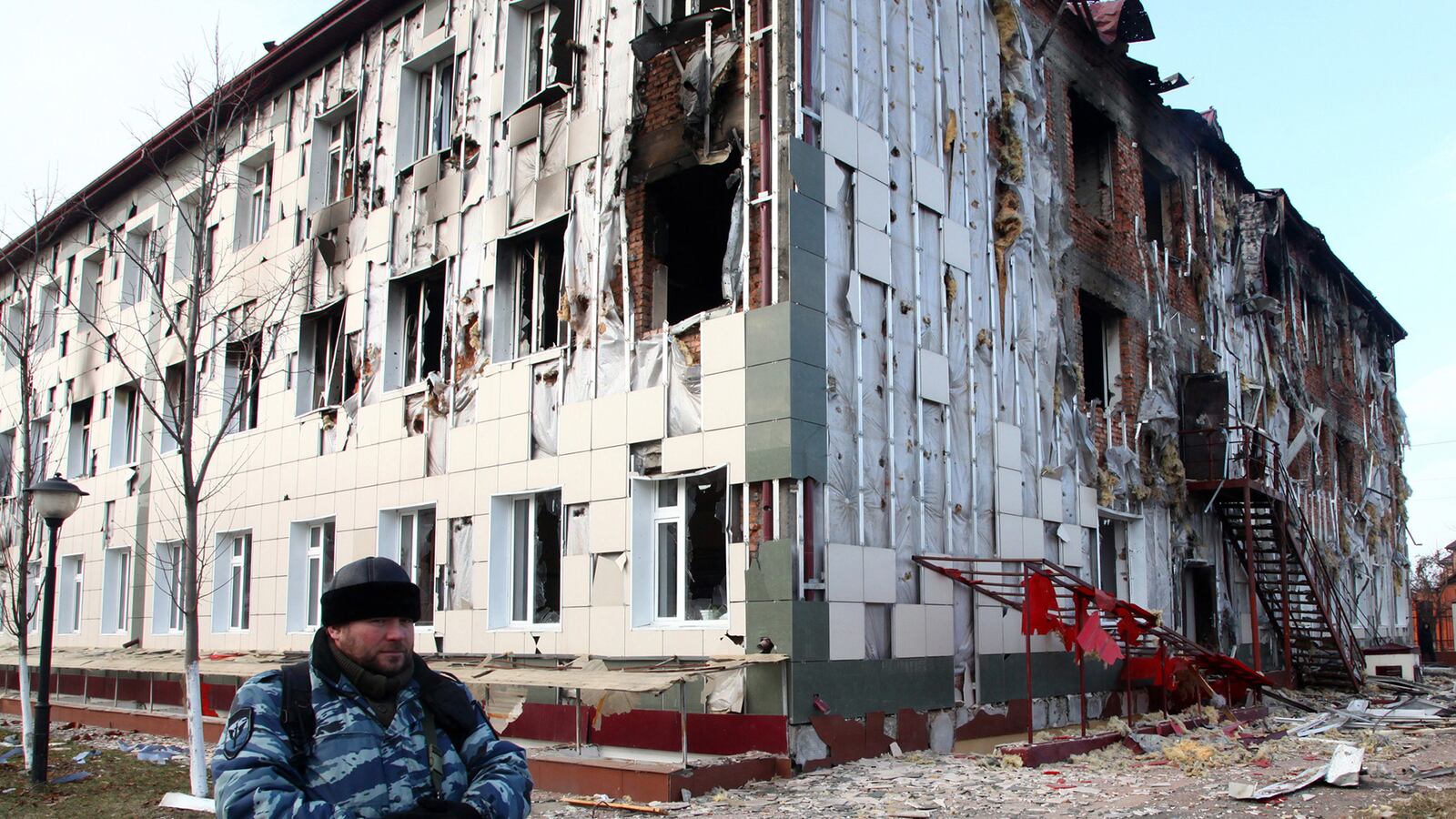GROZNY, Russia—Outside, Chechnya lives its troubled life. Not many pedestrians can be seen on Putin Boulevard. After Thursday’s major attack by Islamist militants in downtown Grozny, police raided the homes of suspects, and Chechen leader Ramzan Kadyrov, furious that 14 police had been killed and dozens wounded, vowed to “deport” the terrorists’ families and “level their houses.”
Inside, at a café that recently opened in the Center of Modern Art, dim light fell on the oil paintings that line the walls and a young woman with her eyes closed quietly played a sad song about Chechnya on a white piano. The café at the TSI, as the center is known, fills up with local artists, photographers, journalists—the class of people in Russia who still call themselves “hipsters,” and they call the café their “oxygen chamber,” one of the few places in town where they feel they can breathe easily.
Outside, again, tensions have not been this high in the Chechen capital for years. Kadyrov, in his rage, has demanded that all fathers turn in their terrorist sons. There are fears of a major new Islamist insurrection, possibly inspired by the so-called Islamic State in Iraq and Syria. Police investigators insist that last week’s attack involved only 15 insurgents, all between the ages of 24 and 27, who arrived on Wednesday night in three taxis from the village of Shalazhi, about an hour outside of town.
On the Internet, Russia’s blogosphere exploded with reactions to Kadyrov’s tweet about punishing the families of terrorists: The word “deportation” is associated in Russia with the tyranny of Joseph Stalin, who had the entire population of Chechnya, hundreds of thousands of people, rounded up and forcibly deported to Central Asia on Red Army Day 1944 in what was called, incongruously, Operation Lentil. The history of horrors in the North Caucasus is so extraordinary and so long as to seem almost otherworldly.
“If we had justice in Russia, Kadyrov would be immediately dismissed from his post as the head of Chechnya, and a criminal investigation would be started against him,” railed Aleksei Melnikov, one of the bloggers.
But Chechnya lives by its own rules: Nobody on the street dares to criticize the Chechen leader or, as officials refer to him, “Pravitel”—The Ruler. So the well-educated TSI visitors follow a rule: “Within these walls, we never talk politics.”
On Saturday night, the center’s founder, Aishat Aduyeva, a tall Muslim woman in a long dress, was making mint and orange teas. Since Kadyrov banned alcohol, these are the most popular drinks. ""As soon as opened the cafe, I discovered that there were many talented musicians, artists, photographers and academics interested in building up a community and creating new projects here," she said.
Aduyeva received her education at the State University of Technology and Design in St. Petersburg. Here in Grozny, she has helped organize the first TSI art exhibits and master classes by internationally renowned pianists and photographers, moves celebrated by Russia’s artistic community, which had never seen the Northern Caucuses demonstrate such a hunger for creative new trends.
People want to turn their eyes to the future, but every visitor to Aduyeva’s gallery and café remembers the post-Soviet war and horrors that lasted, on and off, from 1994 to 2009. “Anything is better than nights when you have to sleep in your clothes in a basement,” says journalist Milana Mazayeva. “Any difficulties we experience now are not as horrible as the constant fear of bombs.”
Twenty years ago, on December 11th, Chechens heard that Russian President Boris Yeltsin had deployed tanks against them. Now, under Kadyrov’s rule, the true memories of war, of the demoralized Russian army and Chechen civilians dying in the crossfire, are not welcome. The coming anniversary is marked by little stickers that say “We remember” or “We are human too,” but little else.
To forget and feel free, professionally and intellectually is the concept behind the Center of Modern Art in Grozny, which is why university professor and psychologist Malika Isayeva calls it “our oxygen-chamber, a place where we come to breathe and forget about totally surreal events we suffered from in the past, and continue to suffer from today.”
On the night last week that Grozny was shaking once again from artillery fire, young Chechen professionals gathered to have tea at their favorite place. As usual on Thursdays, visitors sat together around a table and played a popular Russian intellectual game called Mafia, invented in Soviet times to develop strategic thinking. As described by its inventor, there is an Honest team and a Mafia team that compete against each other. For the Honest team players, the task is to stop the Mafia before it eliminates them, while “Mafia members have to hide their identity and pose as Honest players in order to manipulate the other team players towards self-destruction.”
“It helps us to deal with our post-traumatic disorders, with sad emotions and release our tension in friendly atmosphere,” Isayeva told The Daily Beast.






